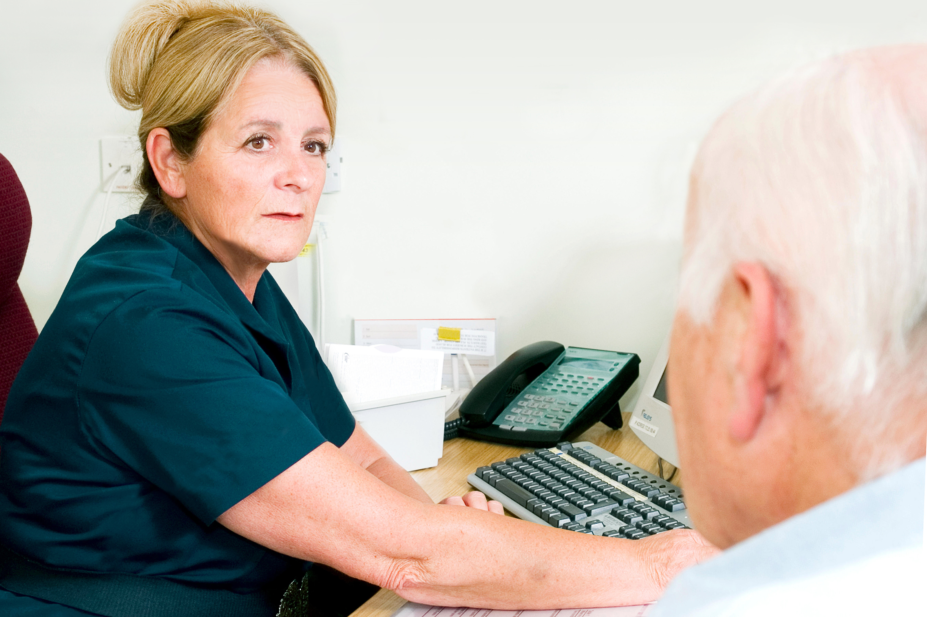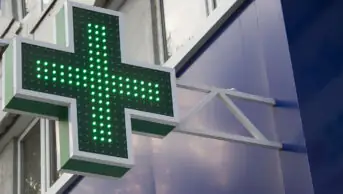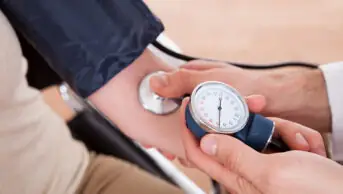
Julian Claxton / Alamy Stock Photo
The government’s latest scheme to tackle thinly stretched NHS is set to launch on 29 October 2019, and it places community pharmacy at its core.
The community pharmacist consultation service (CPCS) will see patients who call NHS 111 with a minor illness, or who are looking for an urgent medicines supply, referred to a nearby community pharmacy.
The service, which is an amalgamation of the NHS urgent medicines supply advanced service (NUMSAS) and the digital minor illness referral service (DMIRS), was first announced as part of the ‘Community pharmacy contractual framework for 2019/2020 to 2023/2024’ in July 2019 as “foremost amongst the new services” outlined in the contract.
Designed to “relieve pressure on the wider NHS by connecting patients with community pharmacy”, contractors will be able to reclaim some of the funding that was removed from the existing contract — by cutting medicines use reviews and establishment payments — through the CPCS at £14 per consultation.
However, the number of referrals to community pharmacy through the CPCS’s constituent parts suggest this may prove challenging.
Data presented by NHS England at the Local Pharmaceutical Committee (LPC) conference — held in London on 25 September 2019 — reveal that there were 8,863 DMIRS referrals completed by pharmacists either in the pharmacy or over the phone between December 2018 and August 2019.
For each of the 1,966 pharmacies that had signed up to offer DMIRS — a voluntary service — this equates to 4.5 consultations per pharmacy over the eight-month period.
And, according to the latest referral data available for NUMSAS, each of the 4,020 community pharmacies offering the service received approximately 61 referrals over the project’s first 26 months (December 2016 to February 2019) — an average of two referrals per pharmacy per month.
This means that the average pharmacy that has signed up for both DMIRS and NUMSAS is set to receive on average £35 each month for around 2.5 consultations when those services are replaced by the CPCS.
Sign-up and referral rates
Jo Churchill, the pharmacy minister, told MPs at a House of Commons debate on the role of community pharmacies on 2 October 2019 that more than 2,000 of the 11,600 pharmacies in England had signed up to offer the CPCS in the first month since registrations opened on 2 September 2019. Unless demand substantially increases, some pharmacists are not confident the sector will be able to recoup the funding that was removed from the existing community pharmacy contract because of the low referral rate.
There is no investment in building public awareness
Hemant Patel, secretary of North East London Pharmaceutical Committee, said each pharmacy signed up to the DMIRS in his area gets an average of one referral every three months from NHS 111.
He told The Pharmaceutical Journal that, to reclaim the £26,200 that he estimates an average pharmacy would lose from the contract changes, each pharmacy would have to conduct six consultations under the CPCS every day, which he said would require “a considerable amount of publicity”.
“If you look at the investment that was made in publicity in North East England where the service started and what the plans are for the rest of the country, it’s a huge contrast,” he said. “There is no investment in building public awareness.”
And, even in the North East, where DMIRS was originally piloted, the number of referrals was a trickle, rather than a flood.
Without publicity, pharmacies will not reach anywhere near two consultations per day
An evaluation of the North East England DMIRS pilot by NHS England in July 2019 found that the 388 pharmacies involved were given 7,404 referrals from NHS 111, of which 5,331 (72%) were either completed by pharmacists or escalated to another healthcare professional.
This amounts to roughly 14 completed referrals per pharmacy between December 2016 and June 2018.
However, the CPCS specification, published by NHS Business Services Authority on 2 September 2019, said the service “must not be actively promoted directly to the public by either the pharmacy contractor or the NHS” to ensure patients only access the service in appropriate cases.
Without publicity, Patel predicts pharmacies will not “even reach anywhere near two per day, or even one per day”.
Transition payments
Nick Hunter, chief officer of Nottinghamshire LPC, agreed that numbers would be low at first, but said the funding should not be looked at as a “one-to-one” trade-off.
“The transition payments will act as that buffer,” he said, adding that pharmacists will also earn money through “the next set of services that are going to come through” as part of the new contract. These are an unspecified number of clinical services, which are to be piloted in the next two years.
The Pharmaceutical Services Negotiating Committee (PSNC) announced on 26 September 2019 that pharmacies would receive up to £833 in monthly “transitional payments” as part of the switch to the new contract, depending on the number of items dispensed per month.
Pharmacists who register for the CPCS before 1 December 2019 or before 15 January 2020 will also receive a one-off payment of £900 or £600, respectively, to cover the cost of implementation.
Despite this, Hunter says he is concerned that the referral rates will “be so low that some pharmacies will see so few [patients through the CPCS] and, therefore, it won’t be embedded in their day job”.
“When they do get a referral there’s a risk that they won’t respond appropriately because they will have forgotten what to do,” he continued.
Michael Keen, chief executive officer at Kingston and Richmond LPC, points out that the CPCS referral rate will be dependent on whether NHS 111 call handlers are aware of the service.
Having raised the issue of low referrals from the existing triage service with NHS England, he says: “The response was ‘yes we’re aware this is happening in some areas, but the call handlers will be trained for the new CPCS … to make sure people do refer patients to pharmacies in appropriate circumstances’.”
NHS England declined to comment on the training NHS 111 call handlers are receiving.
But for the referrals that do reach community pharmacy, Keen says the consultation payment of £14 is not enough “for the amount of work we’re putting in”.
Under the service specification, pharmacists will receive a payment if they hold a consultation with a patient either over the phone or face-to-face. If a physical consultation is booked in but the patient fails to turn up, no payment will be made.
Pharmacists will also be expected to maintain records of their referrals in the CPCS IT system and notify a patient’s GP where an urgent supply of medicine is made or, if necessary, after a minor illness consultation.
Despite these concerns, Keen says he is optimistic about the prospect of “referrals to pharmacies from GPs and that means that maybe we need to look at [the service] as the first step in a longer process” (see Box).
Looking forward
Referrals from the NHS 111 telephone service to community pharmacies is the first phase of the CPCS, with pilot sites testing referrals from general practice already under way in 11 areas across England.
This pilot is expected to end on 31 March 2020. If it is rolled out nationally, Hunter predicts pharmacists could be receiving “tens [of referrals] per day”, which would “enable them to focus on patients that really need to see a GP”.
“That’s where the real gain to the NHS is,” he says.
A successful CPCS will secure pharmacy’s place at the heart of primary care
According to the community pharmacy contract, the government will provide £61m of funding to the CPCS over five years, which it hopes will help to alleviate the NHS’s ongoing problem with patient demand.
However, the pressure for its smooth delivery is also mounting from pharmacy negotiators.
At the launch of the service specification, Alastair Buxton, director of NHS services at the PSNC, said a successful CPCS “will secure [pharmacy’s] place at the heart of primary care and will give the sector leverage for the future; if we choose to ignore what our customer wants, we will not be able to gain that leverage”.
Hunter agrees that a successful CPCS is the “gateway to a lot of other opportunities” for community pharmacy but adds that to deliver it, pharmacies will need to find a new way of working.
As referrals increase, pharmacists “could easily find themselves in the consultation room all morning and, if they’ve not changed the way they work and their skill mix in the pharmacy, then who’s going to check all your prescriptions?” he says.
For this reason, Hunter suggests a gentle introduction could be the best way forward for the CPCS delivery.
“If we start off with the NHS 111 referrals and that increases confidence, then it allows the pharmacies to evolve — to learn and build up the workforce … [and] to start to equip themselves for when the activity gets bigger,” he says. “We need it to be an evolution, not a revolution.”
Box: What does the future hold for the community pharmacist consultation service?
The community pharmacy contract says the community pharmacist consultation service (CPCS) could include GP referrals to pharmacies from April 2020, provided that the pilots are found to be successful. If this happens, NHS England has estimated that 20 million referrals could eventually be diverted from general practice — around 6% of all GP consultations.
After that, pharmacies could receive referrals from NHS 111 online, urgent treatments centres and hospital emergency departments, following successful pilots.
While the influx of referrals could mean more income for pharmacy, Nick Hunter, chief officer of Nottinghamshire Local Pharmaceutical Committee, warns that if a successful CPCS changes patient behaviours, patients could “go straight to the community pharmacy, which means there’s no trigger point for the payment”.
“That will need to be looked at, at some point,” he says. “We need to be mindful that the more successful we all are at this service, the more risk there is that patients will go straight to the pharmacy.”


